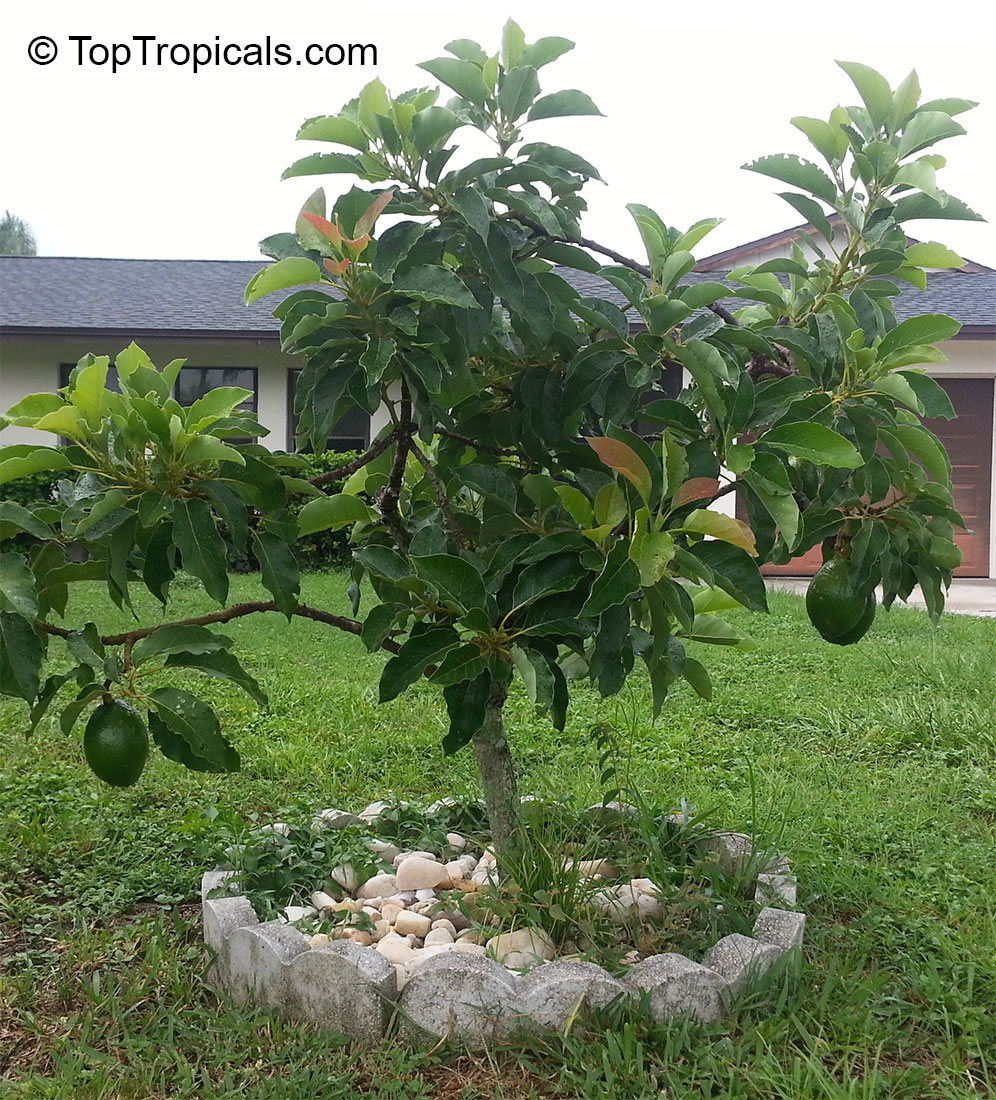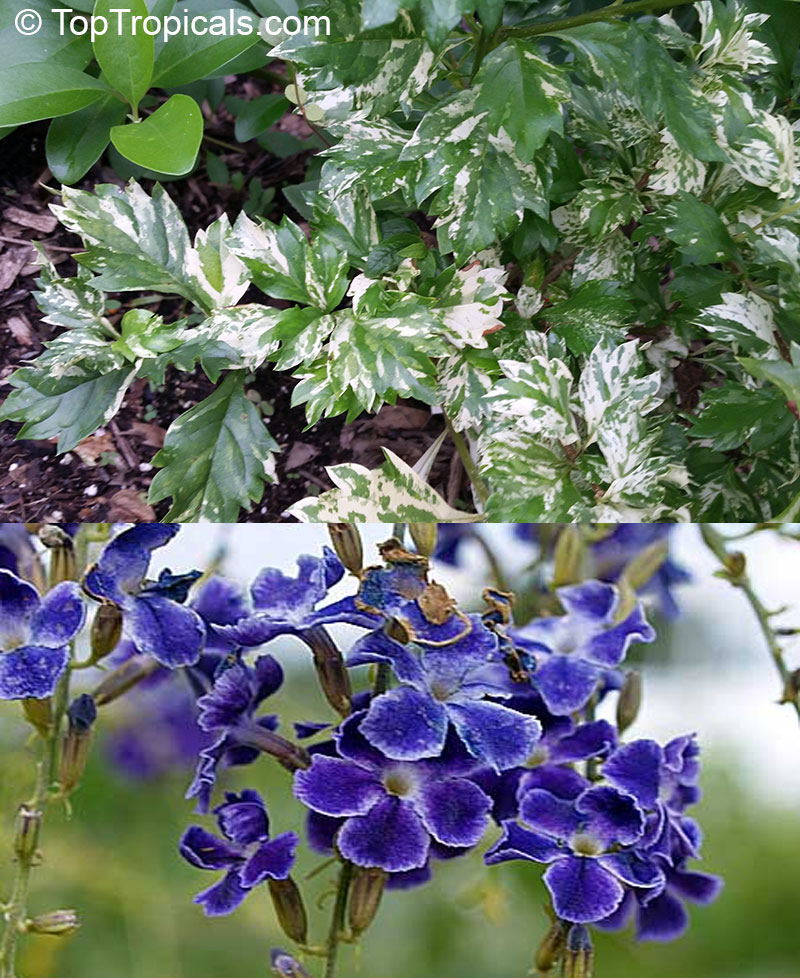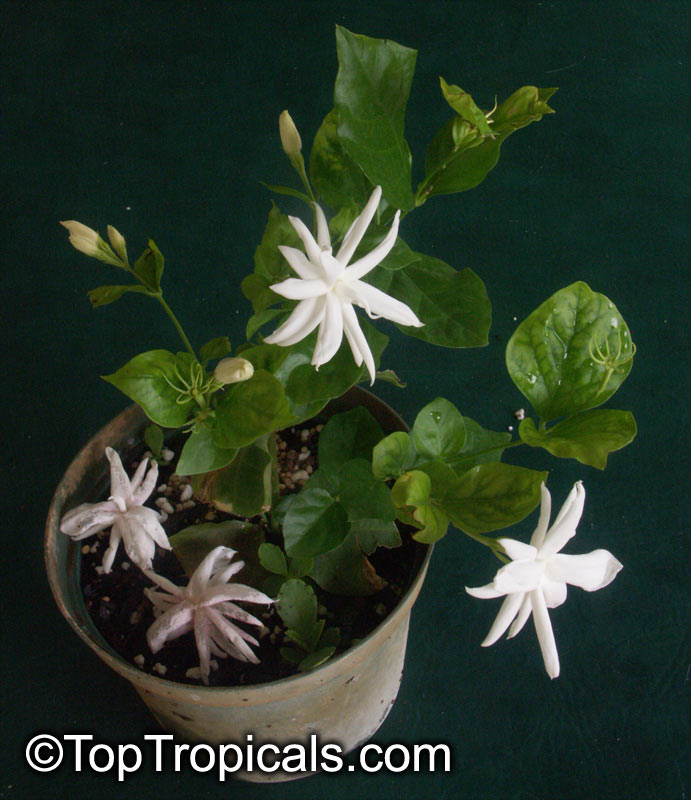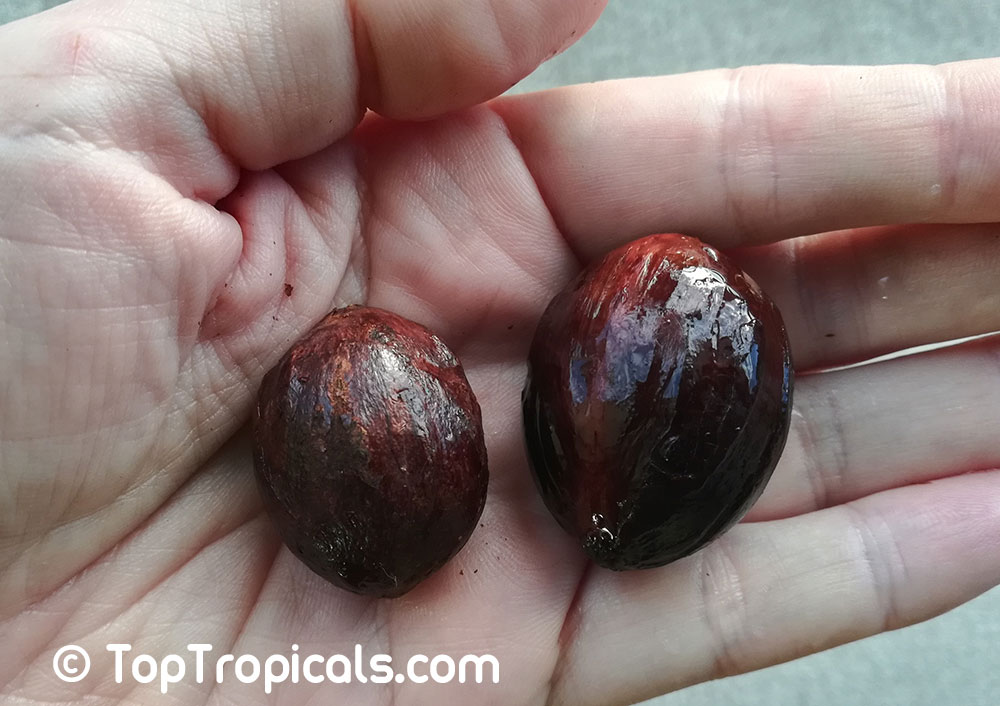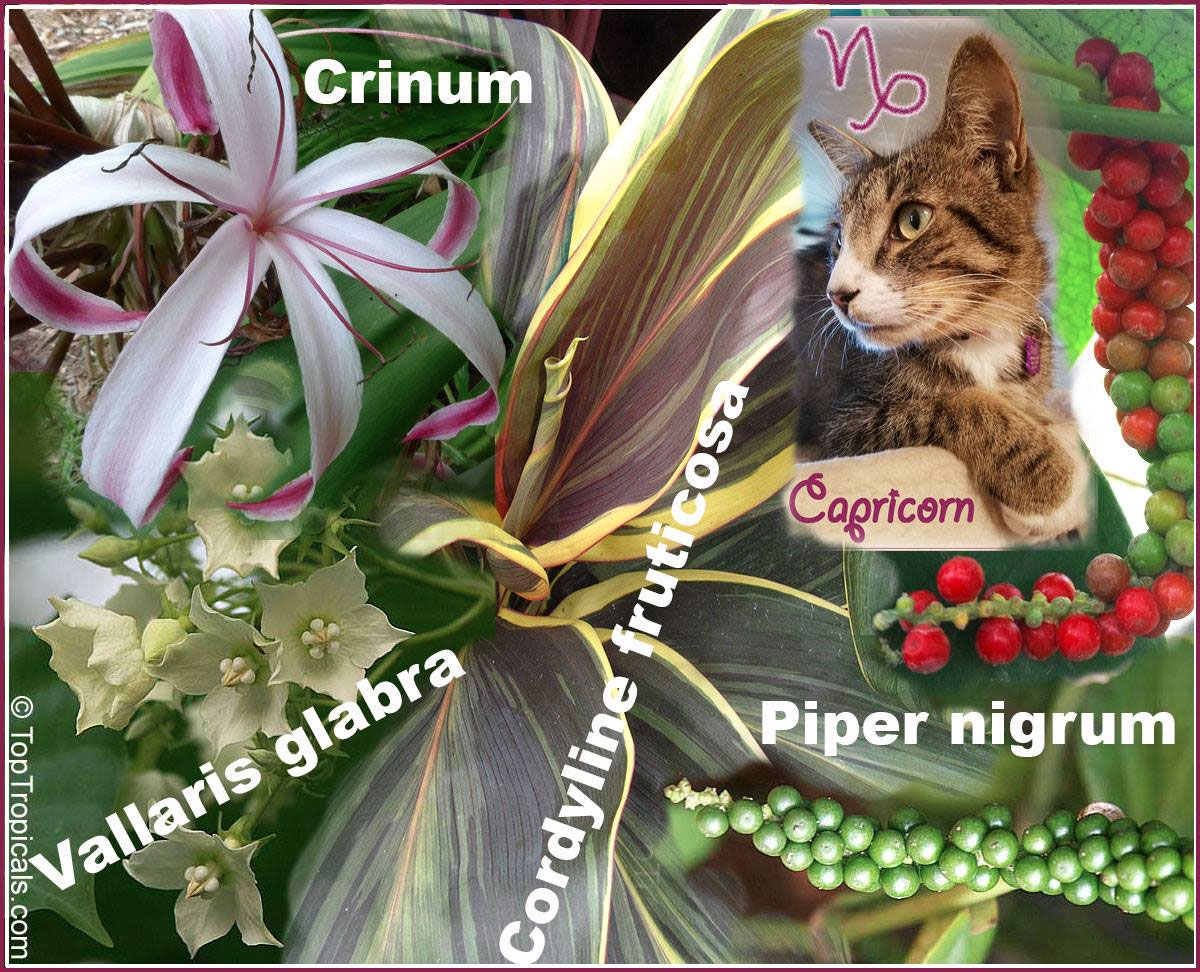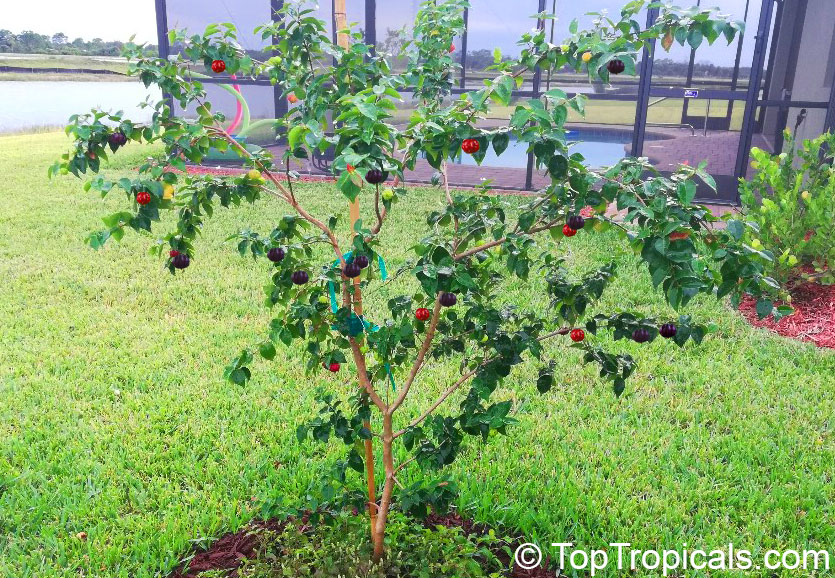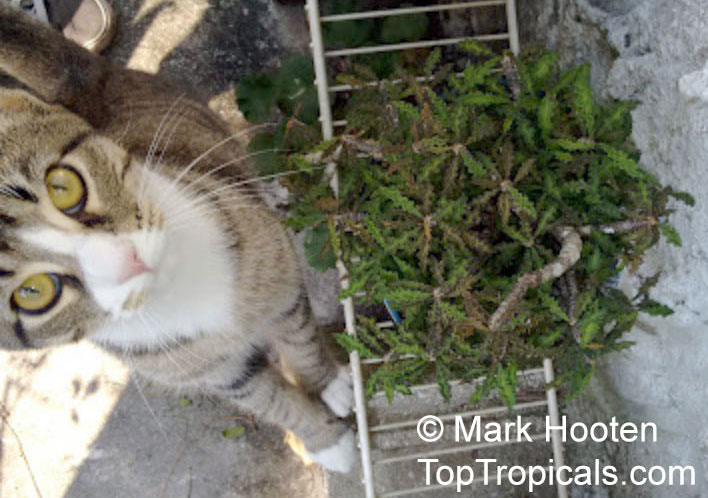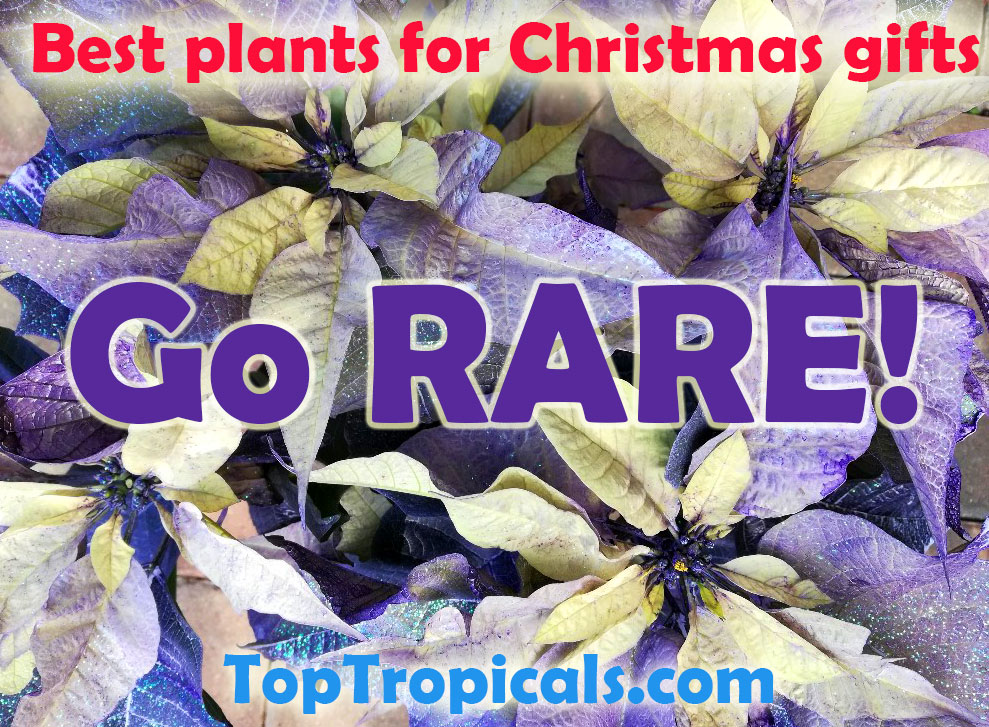Garden Blog - Top Tropicals
Date:
Three interesting varieties of Avocado
Q: I intend to gift three avocados, at least one type A and one type B, to a friend who lives in an area where the temperature never goes below 25F. The idea is to give them a ripening season as long as possible. Which combinations do you suggest, and which are the A and B?
A: When talking about "A" type and "B" type in Avocados, we are referring to the flowers. An avocado will produce both male and female flowers on the same plant. "A" type means that the flowers are female in the morning and male at afternoon. "B" type means that the flowers are male in the morning and female in the afternoon. If you plant to start a commercial growth, then it's important to create a proper mix of both types. However, in hot and humid climate a single tree produces flowers of both types, so it is NOT necessary to have both A- and B- types planted together in the backyard. Even a single tree produces enough fruit for a home gardener.
It is also important to know that while there are "more cold hardy" avocados (hardy to as low as 15F), it refers to a full grown established tree. Young trees still need protection from the cold until they are bigger and more established. One can not expect a small tree planted in June to survive the first winter with a hard freeze. It'll take a few years until the tree is strong enough.
These a few rare varieties that may be of your interest.
Poncho Avocado
Very cold hardy variety. Produces medium to large green fruit. It
survived temperatures around 10F near San Antonio, Texas (Zone 8b). Mature trees
can take temperatures down to 15F for short period of time without significant
damage.
Anise Avocado
This avocado has strongly scented leaves that smell like Anise. Very
rare variety. Fruit is of excellent quality, creamy and buttery.
Catalina Avocado
Catalina is a very nice mid-season pear-shaped fruit that is especially
rich and creamy. It is an extremely popular variety in South Florida in the
Cuban Community. The Story of this variety says...
...Catalina is an amazing avocado floated across from Cuba, 60 years
ago just before Fidel Castro took over the Island Nation. Wise Cubans jumped
into the ocean to escape the Castro regime and tossed in some favorite scions
for us to enjoy here in the States. We owe a great debt to poor old Don Miguel
Cruz de la Santa Maria Espinoza Sanchez Alvarez Jr. who sadly was lost at
sea. His amazing scion wood, wrapped in cellophane and aluminum foil floated
over, washing ashore on Miami Beach. His shiny little package was miraculously
picked up on the shoreline and immediately grafted and cared for by keen-eyed
avocado lovers in Miami...
So be sure to think about this story every time you eat a Catalina!
These three Avocados will provide you with fruit ripening during the whole warm season. See more information on avocado varieties and the most cold hardy cultivars.
Check out our full selection of avocado varieties. They are 15% OFF today!
Date:
Top Tropicals New Year Resolutions
We take this opportunity to extend our grateful thanks to all visitors and friends of our garden and website. The entire Top Tropicals team wishing you a Happy New Year with Happy New Plants!
In 2019, Top Tropicals plans include (but are not limited to):
- improved design of the website, online store and shopping cart
- many new introductions of rare flowering plants including Red Jade
Vine, lots of new Adeniums
- rare fruit trees, including Mangosteen, Nutmeg, Clove and more
- extended selection of rare tropical seeds
- many new videos of rare tropical plants
- free and discounted shipping
Stay informed with our Newsletter updates!
New Year Resolutions for Gardeners in 2019
January is the month to plan and dream about your yard and garden. Grow
your garden a few steps at a time each year: pick a few resolutions for 2019
and plan accordingly. Next year, a few more, and so on until you build the
garden of your dreams.
This winter, resolve to:
- Hang a bird feeder.
- Order seeds of some rare plants so you can have an early start.
- Prune a tree into an espalier - it's a perfect time before Spring.
- Ask your grandparents what they grew in their gardens.
- Build a raised bed for succulents.
- If you live in a warm climate, plant a fruit tree or two.
- Start a compost pile.
- Plant a palm tree.
- Try some plant boosters to improve your plants hardiness.
- Chose Flowering trees, shrubs and vines suitable for areas in your garden that still have room...
- Install a rain barrel.
- Eat outside as often as possible.
- Show a child how to plant a tree.
- Provide a water source for bees and butterflies. They are not only
cool, but also pollinators that will help to set fruit and seeds!
- Call TopTropicals for garden advise - what to plant, where to plant,
and how not to kill it!
- Plant a berry-bearing tree or shrubs to feed the birds. Mulberry, Blackberry, Tropicals Cherries - are always good choices. They are 15% OFF now, offer expires 1/8/19.
- Rake and save fallen leaves for winter mulch for your garden beds.
- Save seeds from flowers to plant next year.
- Give plants as gifts all year long.
Happy gardening in 2019!
Date:
NEW VIDEO:
Malpighia punicifolia - Dwarf Barbados-Cherry, Dwarf
Acerola. This dwarf form of Acerola makes a wonderful low-growing shrub or
beautiful bonsai tree with edible fruit. Profuse bloomer, it is also a nice
ornamental! Due to its shallow and smaller root system, Acerolas can be interplanted
with other crops more closely than many trees. Acerolas grows in marl,
limestone, clay and other heavy soils as long as it drains well. Has the highest
vitamin C content of any fruit. 1 Cherry is equal to 12 oranges. Used in
jellies, jams, freezes without losing its vitamin C content. The plant is drought
tolerant and easy to grow.
Malpighias are available from our store
Stay updated with TopTropicals Videos by subscribing to our channel at YouTube.com/TopTropicals and get our latest video news of what is fruiting and blooming!
Date:
FEATURED BUTTERFLY PLANT:
Duranta variegata - Variegated Sky Flower
Variegated Sky Flower is grown for its summer flowers and ornamental fruit. This evergreen fast-growing shrub spreads and arches to 10 feet tall and wide and is great for live hedges and covering fences and corners. In the summer, cascading clusters of blue tubular flowers appear followed by wonderfully contrasting orange-yellow berries. This variegated form has creamy-yellow margins around the one inch long serrated leaves. In mild climates, this plant can be in flower nearly year round with flowers and fruit appearing at the same time. It does best in full sun with frequent deep watering and is hardy to about 20-25F. A good choice for espaliers, as a small tree or large bush; all forms benefit from frequent selective pruning. Flowers are very attractive to butterflies. Great for providing a color contrast in the landscape, and is especially well-suited as a bright-colored background or screening. Prune back in late winter to encourage a more compact shape and strong flush of fresh spring foliage. Requires moderate watering in a well-drained soil.
Date:
How to get a Jasmine to bloom.
Caring for jasmines as container plants during Winter
Locate the jasmine plant where it will receive bright filtered light at least six hours every day.
Put a few pebbles in a shallow plate or tray and pour fresh water over the pebbles. Set the pot on the pebbles, but don't let the water level touch the bottom of the pot. This increases the humidity in the air around the jasmine. Keep the plant away from wood stoves, heat vents and radiators.
Water the jasmine when the top 1/2 inch of the soil feels dry. Don't let the soil get soggy, and never let the pot sit in water. Water the plant sparingly during the winter.
Feed jasmine twice a month between Spring and early Fall, using a granulated slow-release, or water-soluble houseplant fertilizer mixed at half strength. Don't fertilize during the winter months.
Prune the jasmine as needed to maintain the desired shape. Never prune in winter, as the plant will be preparing to bud.
Encourage the jasmine to bloom by putting it in a cool room at night for four to five weeks during Fall to Early Winter. The plant should get plenty of sunlight during the day, but during the night, move it to a pitch-dark room where the temperature is between 40 and 50 degrees F. After four to five weeks, leave the plant in its regular, daytime location. The plant should start blooming in mid-Winter to early Spring.
See all jasmine plants...
Date:
Growing Nutmeg from seed: secrets of successful germination
Q: I received a Nutmeg nut and I am wondering do I need to open a hard shell before planting it? Any other tips on growing nutmeg from seed? When will you have Nutmeg plants for sale?
A: We just
received fresh nutmeg seeds from Sri Lanka and planted them right away, so
we should have Nutmeg plants by Spring/Summer. These are some tips on how to
make germination a success:
- nutmeg seeds are viable only for a few weeks after harvesting so
plant them as soon as possible.
- wash the seed and soak it in warm (100F) water with a few drops of SUNSHINE-S
booster that improves germination. Soak for up to 24 hours. You may use
a thermos to keep it warm.
- there is no need for scarification. The outer shell of nutmeg is
hard, however, it is not thick so the water will penetrate easily. On the photo
above, you can see 2 seeds: the one on the right expanded twice in size after
sozking.
- Plant in a porous soilless mix, preferably light seed germination mix, in 4-6" pot, and keep moist but not soggy. You
may cover the pot with plastic to keep moisture in.
- Unless you are germinating the seed in hot tropical conditions, you
should use bottom heat - 80-85F. A heating pad is the best solution (make sure
it doesn't have a timer that automatically shuts it off). For safety, use
GFI protected electric outlets since you will be watering the pot.
- Be patient and allow a few weeks for germination. Once the seed
sprouted, keep it in bright filtered light and apply SUNSHINE Superfood to young seedling, along with a small dose of Slow Release Fertilizer, for kickstart.
- Move the seedling out in bright sun light once the temperature
outside is above 70F.
We have a very long waiting list for Nutmeg plants (item 3878) and seeds (item 6203), so you may reserve one for yourself using our Wishlist form; this way you will be notified immediately when we have the plants in stock, as they won't last long. A few seeds are still available for sale, order now while they are fresh:
Date:
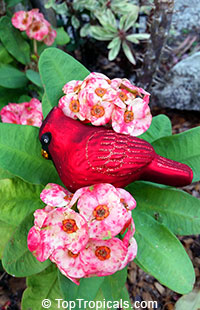

Capricorn - 12/22
- 1/19.
An EARTH sign ruled by the planet Saturn. Capricorn's plants usually have
few flowers, or small flowers, are knobby or woody, and may have an unpleasant
smell or taste. Saturn rules plants with long lives and slow growth, so
plants with annual rings are also associated with the Goat.
Physiologically, Saturn rules the systems that give the body its
structure and form: the skeletal system, and the skin, teeth, joints, and knees, so
plants that are high in calcium can be very beneficial. Those can be woody
plants and shrubs that show annual rings, as well as some poisonous or
narcotic plants. Saturn plants are useful in treating arthritis and rheumatism.
Traditional Capricorn appreciates a spice that is powerful but familiar. Black pepper adds flavor and a bit of heat to both food and life,
creating movement without too much change.
Capricorn Zodiac
lucky plants:
Baobab, Peach Palm, Patchouli, Bamboo, Cordyline, Spider Lily, Serissa, Desert Rose, Croton, Aloe, Palms, Giraffe knee plant - Gonatopus boivinii, Adenanthera, Black Pepper, Solanums, Loquat, Aglaonema, Jacaranda, Rosemary, Shisham - Dalbergia sissoo, Neem Tree, Nutmeg, Calendula, Brugmansia, Cannabis, Coca, Kava-Kava, Root Beer plant, Kratom, Banesteriopsis, Psychotria, Quince, Almonds, Ginkgo, Olive, Strophanthus, Bread Flower, Amorphophallus, Areca Palm, Anadenanthera, all Pipers, Brunfelsia, Chaya, Persimmons, Surinam Cherry, Bel Fruit, Ashoka Tree, Calla Lily.
For other signs information, see full Plant Horoscope.
Date:
Christmas Special - Lolita Cherry
This amazing cherry is by far our favorite. Lolita is an exclusive
variety of Black fruited Surinam Cherry that starts as red and turns black as it
ripens. The fruit has exceptional flavor and has no aftertaste, unlike regular
Surinam cherries. It is large, 1-1.5" size, super sweet when fully ripe. The
tree is a dwarf statue, 5-6 ft or smaller if pruned. It is upright and
freely branching. Plants start flowering and fruiting in 1 gal container. The
plants we have in stock are ready to fruit in 2019.
These cherries are cold hardy and can take short periods of frost. Once
established, the plant can withstand upper 20's without damage.
Lolita is very hard-to-find, and we have limited quantities, hurry up!
To expedite your order for Christmas, request rush shipping in order notes, contact us or call Anna Banana direct @ 239-771-8081.
Happy Holidays!
Date:
Plants which are family members

By Mark Hooten, the Garden Whiz
...Perhaps approaching the New Years Season makes me appreciate the plant people I've known. It also made me take stock of the great plants I've had for the longest time. Doing so, I've come to realize that I care for over a handful of potted plants which I have
owned for a number of decades. This Euphorbia decaryi is one of them... Read the story...
...I wonder about other folks' special plants which they have kept for so long they seem like family members. So I ask any of our online friends to send us images and the brief history of some special plant which they have cared for and loved for a LONG TIME! You know, heirloom type plants. We would love to share stories and pictures of these special plants with others!..
Check out our Euphorbias...
Date:
Six ideas for the best Christmas gift plants
It's this time of the year again when a million dollar question arises: "What do I get them for Christmas?" It's an easy task to buy a gift for a gardener - because we always have a long wish-list! But what to get for everybody else? The answer a simple - buy a live plant... that can bring: Surprise, Love, Joy, Meaning, Convenience, and an Action into their lives! Below are a few wise suggestions.
1. Surprise for Tradition. Everybody knows Ponsettia. Everybody buys it. Every house has it... Red, yellow, white,
and even purple... unusual? No, simply dyed with a paint. Ahh. Go RARE!
Ponsettia is Euphorbia, get a rare Euphorbia. It has indestructible nature,
almosts zero maintenance, and FREE shipping!
Euphorbia leucocephala - Snows of Kilimanjaro
Euphorbia
geroldii - Thornless Crown of Thorns
Euphorbia Exotic Thai Candyland, variegated leaves
Euphorbia Pink Cadillac
2. Love. Gardenia Aimee Yoshioka First Love. With a dramatic history behind this cultivar, it is a perfect expression of Love that one can bring to another for Christmas...
3. Joy of Miracle. Miracle fruit. It speaks for itself and is one of the greatest container plants.
4. Meaning. Symbol of Long Life! Adansonia digitata - Baobab, also called the Tree of Longivity, can live for 5000 years. Pass this remarkable plant in your family from generation to generation! Regarded as the largest succulent plant in the world, the Baobab tree is steeped in a wealth of mystique, legend and superstition wherever it occurs in Africa, being a tree that can provide food, water, shelter and relief from sickness. FREE shipping and easy to maintain bonsai.
5. Convenience. A gift card will give your loved ones a chance to browse amazing wonderland of Tropical Plant World, pick something they like and have it shipped to them weather permitting. The gift card (certificate) has no expiration date!
6. Action. Coffea arabica - Coffee. Want to give your kids a project to drag them away from their smartphones? Have them grow a Real Coffee tree. It is a rewarding plant that is happy indoors and gives you a feeling of Creator - for your care, it will bloom for you with fragrant flowers and fruit for you with real coffee beans!
Check out the full list of plants that are great gifts!
If you need further advice on great looking gift plants for Christmas, contact us!
Or call Anna Banana direct @ 239-771-8081.
Happy Shopping!
